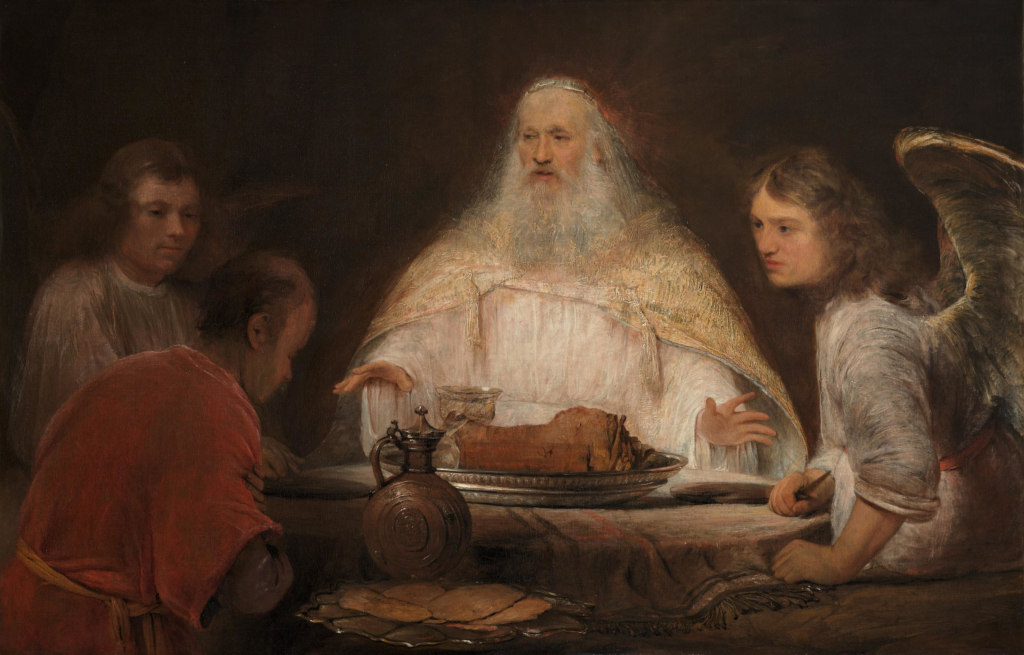
| Arent de Gelder 1645-1727 |
Three white-clad men walk out of the desert, out of the shimmering sands. Calm holiness. Abraham, the Patriarch, “very wealthy in silver and gold, sheep and cattle and camels and male and female donkeys, menservants and maidservants” runs to meet them, bows low to the ground, and offers him his most lavish hospitality: a freshly slaughtered calf, yogurt and milk, and bread from the finest flour,
It is a theophany; Abraham sees the pre-incarnate Christ. (And some theologians suggest, the trinity: The Father, Son and Holy Spirit). In other words, Abraham sees God.
“Then one of the men said, “I will surely return to you about this time next year, and Sarah your wife will have a son” (Gen 18:10).
* * *
And Sarah, listening at the entrance of her tent, out of sight, snorts.
Same old, same old, same old promises. The son, descendants, more of them than the stars in the sky and the grains of sand in the seashore.
Well, God, that sounds wonderfully poetic, all those promises, but you know, as for me, here, in space and time, time is passing, time has passed, and well, I could do with just one child. I have waited so long. I have hoped so long. Is that too much to ask? Well, yes, apparently so!
I am weary of these promises. I am weary of hope. “After I am worn out and my lord is old, will I now have this pleasure?” she thinks. (Gen 18:12)
And Sarah snorts!
* * *
Then the Lord said to Abraham, “Why did Sarah laugh and say, ‘Will I really have a child, now that I am old?’ 14 Is anything too hard for the Lord?” (Gen 18: 13-14)
But perhaps the Lord also thought, “Yeah, I get Sarah. I have tried their hope and faith and patience for long decades. Perhaps too long. I have given them a good life full of richness. I have blessed them in every other way, but I know their longing, their heartbeat. It is for a son. It is for Isaac.
I waited so long so that they would never doubt that Isaac was mine, and not theirs. So that they would never fail to see my glory in this baby, Isaac. Never doubt Isaac was a miracle baby, my miracle ancestor, pre-figuring when I too would enter human history as a miracle baby, the greatest miracle of all.
But it is now time. Time for their miracle. Time for Isaac.”
“I will return to you at the appointed time next year, and Sarah will have a son.”
Sarah was afraid, so she lied and said, “I did not laugh.”
But he said, “Yes, you did laugh.” (Gen 18: 14-15)
* * *
Ah, Sarah, how you blown it. Snorting at a theophany! Snorting at Christ and his angels! You’ve lost hope. Bitterness snakes around your heart. You no longer have the energy, the courage to hope, and who can blame you?
And then you lie! You lie to the Lord, who sees your heart.
But are you zapped, turned to a pillar of salt, as Lot’s wife was?
No, the Lord understood your longing, your disappointment, your frustration.
And despite your snort of laughter, your spontaneous lie, He reiterated his promise, no longer vague, but definite now, at last. “I will return to you at the appointed time next year, and Sarah will have a son.”
And He did, and you did, and you called him Isaac, which means laughter. Your snort of derisive laughter was redeemed; it became the laughter of joy at your miracle baby.
* * *
Sometimes, our dreams seem ridiculously enormous, and it seems very unlikely that they will ever come to pass, our faith wavers, and the years pass, but our dreams, the promises we heard God whisper to us, the destiny we are born for, has not come to pass, and when we verbalise our dreams, we almost snort.
And how can you, Lord, bless someone who has so blown it?
And you see us, you know our frame; you know we are but dust, you have compassion on our flagging faith amid our thwarted dreams. And so though we do not deserve it, you come to us; you bring the destiny you have promised us to pass, though it may not look like what we had dreamed of. Seeds beneath the desert soil burst into desert flowers.
You give us the fruits of your promise, whose name is laughter. You enjoy the pun, artist that you are, transforming our snort of sceptical laughter to laughter like a running brook.
